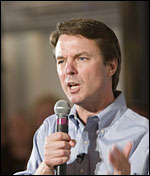
Update: John Edwards dropped out of the presidential race on Jan. 30, 2008.
During his single term representing North Carolina in the U.S. Senate, John Edwards received a middling 63 percent rating from the League of Conservation Voters — a score lower than might have been expected because he missed a number of key votes while campaigning for president and vice president in 2003 and 2004. In his current campaign for president, Edwards has been more aggressive on the issue of climate change than other Democratic candidates, who’ve ended up following his lead.
Read an interview with John Edwards by Grist and Outside.
Key Points
- First presidential candidate to call for reducing greenhouse-gas emissions 80 percent by 2050, in March 2007. Would launch a cap-and-trade program in 2010 to bring emissions down 15 percent by 2020, as an interim step to the 2050 goal.
- First major presidential candidate to make his campaign carbon-neutral, in March 2007. He’s buying carbon offsets to neutralize the effects of his campaign travel and office energy use, while also cutting energy consumption at campaign offices, buying recycled-paper office products, and encouraging staff to walk to work and take other energy-saving measures. (Tom Vilsack was actually the first candidate to go carbon neutral, but he dropped out of the race in February 2007.)
- Introduced a detailed energy plan before any of the other candidates.
- Proposes a $13-billion-a-year New Energy Economy Fund that would invest in renewable energy, efficiency, carbon-capture technology, and cleaner cars; help entrepreneurs start new clean businesses; encourage Americans to buy more-efficient appliances and save energy; and help workers in carbon-intensive industries transition to new job fields. The fund would be financed by the auctioning of permits to emit greenhouse gases and the repeal of some oil-industry tax breaks.
- Calls for a ban on new coal power plants unless they’re compatible with carbon-capture and -storage technology.
- Opposes nuclear power.
- Opposes government investment in coal-to-liquid technologies.
- Has been endorsed by Friends of the Earth Action for his position on nuclear power and early support of strict climate legislation.
Video and Audio
Watch Edwards explain his positions on climate change and energy issues at a Nov. 17, 2007, Grist-sponsored forum:
Watch Edwards at a Step It Up 2007 rally in Fort Myers, Fla., on April 14, 2007:
[vodpod id=Video.16092244&w=425&h=350&fv=%26rel%3D0%26border%3D0%26]
Watch Edwards speak about nuclear power at the Democratic presidential debate on Jan. 15, 2008:
[vodpod id=Video.466350&w=425&h=350&fv=%26rel%3D0%26border%3D0%26]
Listen to an Edwards podcast on climate change, calling attention to the Live Earth concerts, from July 7, 2007:
Listen to an Edwards podcast on the Step It Up climate campaign, from April 14, 2007:
Listen to a clip of Edwards’ interview with Grist and Outside:
Quotable Quotes
- “Our generation must be the one that says, ‘we must halt global warming.’ If we don’t act now, it will be too late. Our generation must be the one that says ‘yes’ to alternative, renewable fuels and ends forever our dependence on foreign oil. Our generation must be the one that accepts responsibility for conserving natural resources and demands the tools to do it. And our generation must be the one that builds the New Energy Economy. It won’t be easy, but it is time to ask the American people to be patriotic about something other than war.”
— March 20, 2007, in a speech that introduced his energy plan
- “I do not favor nuclear power. We haven’t built a nuclear power plant in decades in this country — there’s a reason for that. The reason is it’s extremely costly, takes an enormous amount of time to get one planned, developed, and built, and we still don’t have a safe way to dispose of the nuclear waste — and it’s a huge problem for America over the long term. I also don’t believe we should liquefy coal. The last thing we need is another carbon-based fuel in America. We need to find fuels that are, in fact, renewable, clean, and will allow us to address directly the question that has been raised, which is the issue of global warming, which I believe is a crisis.”
— July 23, 2007, in a CNN/YouTube debate between Democratic candidates
- “I think Americans are actually willing to sacrifice. One of the things they should be asked to do is drive more fuel efficient vehicles.”
— at an International Association of Machinists and Aerospace Workers forum in Florida, Aug. 28, 2007

